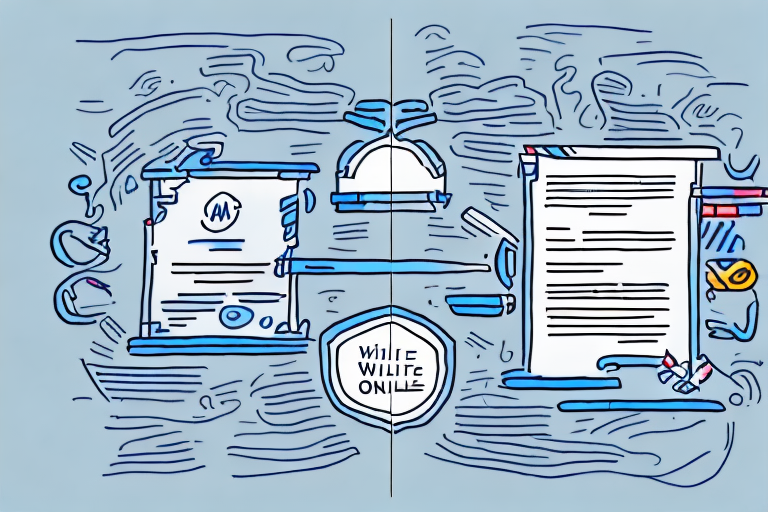What to Consider When Making Best Online Wills
Drafting a will can be a difficult and emotional process, but it is essential for ensuring that your wishes are carried out after your passing. In today’s world, there are multiple options for creating a will, one of which is using an online platform. While creating an online will may offer convenience and cost savings, it’s important to carefully consider the advantages and disadvantages, legal requirements, and key components before making a decision.
Understanding the Basics of Best Online Wills
What is an Online Will?
An online will, also commonly referred to as an electronic will or a digital will, is a legal document that is created and stored electronically through an online platform. Best online wills have become increasingly popular in recent years due to their convenience and accessibility.
Creating an online will typically involves answering a series of questions about your assets and beneficiaries. The online platform will then generate a customized will based on your answers. This process can be completed from the comfort of your own home, without the need to visit a lawyer’s office.
How Does an Online Will Differ from a Traditional Will?
The basic components of an online will are similar to those of a traditional will. Both types of wills allow you to specify how you want your assets to be distributed after your death and who will be responsible for carrying out your wishes.
However, traditional wills are typically handwritten or typed and signed in the presence of witnesses. This process can be time-consuming and may require multiple visits to a lawyer’s office. Online wills, on the other hand, are often entirely electronic and typically require some form of electronic signature. This makes the process of creating a will much more efficient and convenient.
It’s important to note that online wills may not be recognized in all states. Some states have specific requirements for the execution of online wills, and failure to meet these requirements could result in the will being declared invalid.

Legal Requirements for a Valid Online Will
Before deciding to create an online will, it’s important to understand the legal requirements for creating a valid online will. These requirements can vary by state, but generally, an online will must be properly executed and signed by the testator (the person creating the will) and witnesses in accordance with state law.
Additionally, the testator must have the capacity to sign the will and understand the necessary legal elements. This means that the testator must be of sound mind and understand the nature of the document they are signing.
It’s also important to ensure that the online platform you use to create your will is reputable and secure. You’ll be providing sensitive personal and financial information, so it’s crucial to choose a platform that takes data privacy seriously.
Overall, online wills can be a convenient and cost-effective way to create a will. However, it’s important to understand the legal requirements and potential limitations of online wills before deciding if they are right for you.
Advantages and Disadvantages of Online Wills
Creating a will is an important part of planning for the future, but it can also be a daunting task. While traditional methods of creating a will involve scheduling appointments and meeting with an attorney, online will platforms have become increasingly popular in recent years. While online wills offer convenience and ease of use, there are also some potential drawbacks to consider.
Pros of Creating an Online Will
One of the key advantages of creating an online will is the convenience it offers. Online will platforms typically make it easy to create a will from the comfort of your own home, without having to schedule appointments or meet with an attorney. This can be particularly beneficial for individuals with busy schedules or mobility issues. Online wills also often come with step-by-step instructions and guidance, making the process of creating a will less intimidating.
Another advantage of online wills is the ability to update or revise them quickly and easily. Life circumstances can change rapidly, and an online will can be updated in real-time to reflect those changes. This can save time and money compared to traditional methods of creating a will, which may require scheduling additional appointments and paying additional fees.
Cons of Creating an Online Will
While online wills offer convenience, there are also some potential drawbacks to consider. One of the main disadvantages of creating an online will is the risk of errors or omissions. Without the oversight of an attorney or other professional, online wills may not include all necessary legal elements or address all important issues. This can lead to unintended consequences and legal challenges down the line.
Additionally, an online will may not be suitable for complex estates or situations that require specialized legal advice. Individuals with significant assets or complex family situations may benefit from the guidance of an experienced estate planning attorney, who can ensure that their wishes are properly documented and legally enforceable.
It’s also important to note that online wills may not be recognized in all states. Each state has its own laws and requirements for creating a valid will, and online will platforms may not be equipped to address all of these nuances. It’s important to research the laws in your state and ensure that any online will you create meets the necessary legal requirements.
In conclusion, online wills offer a convenient and accessible option for individuals looking to create a will. However, it’s important to weigh the potential advantages and disadvantages, and to consider consulting with an attorney for more complex estate planning needs.

Choosing the Right Online Will Platform
Planning for the future can be a daunting task, but it’s important to ensure that your assets and loved ones are protected in the event of your passing. One way to do this is by creating a will. While traditional methods of creating a will involve hiring a lawyer or visiting a notary, online will platforms have become increasingly popular in recent years.
Factors to Consider When Selecting a Platform
When choosing an online will platform, there are several factors you should consider. One of the most important is the platform’s reputation and history of successful use. You want to make sure that the platform you choose has a proven track record of helping people create legally binding wills.
It’s also important to consider the level of support offered by the platform. Some platforms offer extensive help and assistance with creating and executing the will, while others may leave you on your own to navigate the process. Depending on your level of comfort with legal documents, you may want to choose a platform that offers more support.
Another factor to consider is the cost of the platform. While some platforms may be more affordable than others, it’s important to remember that creating a will is an investment in your future and the future of your loved ones. You want to make sure that you’re getting the best value for your money.
Top Online Will Platforms to Consider
There are many online will platforms available, each with its own unique features and benefits. Here are a few popular options:
LegalZoom
LegalZoom is one of the most well-known online will platforms. They offer a variety of legal services, including will creation. Their platform is user-friendly and offers a lot of support to help you create your will. They also offer a 100% satisfaction guarantee, which can give you peace of mind when using their service.
Trust & Will
Trust & Will is a newer platform that has gained popularity in recent years. They offer a variety of estate planning services, including will creation. Their platform is easy to use and offers a lot of customization options to help you create a will that meets your specific needs. They also offer a 30-day money-back guarantee.
Quicken WillMaker
Quicken WillMaker is a popular option for those who want to create a will quickly and affordably. Their platform is user-friendly and offers a lot of support to help you create your will. They also offer a variety of other legal documents, such as power of attorney and living wills, which can be helpful if you’re looking for a more comprehensive estate planning solution.
Ultimately, the platform you choose will depend on your specific needs and preferences. By considering the factors outlined above and researching different platforms, you can find the one that’s right for you.

Key Components of an Online Will
An online will is a legally binding document that outlines how a person’s assets and property should be distributed after their passing. While traditional wills are often created with the help of a lawyer, online wills offer a convenient and cost-effective alternative, allowing individuals to create a will from the comfort of their own home.
Personal Information
One of the most important components of an online will is personal information. This includes the testator’s full legal name, address, and identification information. This information is necessary to properly identify the testator and ensure the validity of the will. It’s important to keep this information up to date, as changes in address or other personal information can impact the validity of the will.
Additionally, it’s important to consider including information about any digital assets, such as social media accounts or online banking information. This can help ensure that these assets are properly distributed and managed after the testator’s passing.
Executor and Guardian Appointments
The appointment of an executor and, if applicable, guardians for minor children is another important component of an online will. The executor is responsible for carrying out the instructions outlined in the will, while guardians are responsible for caring for minor children in the event of the testator’s passing.
When selecting an executor, it’s important to choose someone who is trustworthy and capable of managing the distribution of assets. It’s also important to consider selecting a backup executor in case the primary executor is unable to fulfill their duties.
When selecting guardians for minor children, it’s important to choose individuals who are responsible and capable of providing a safe and loving home for the children. It’s also important to discuss this decision with the selected guardians to ensure they are willing and able to take on this responsibility.
Asset Distribution
Asset distribution is another essential component of an online will. This includes directing how assets should be divided and distributed among beneficiaries, as well as outlining any specific instructions for certain assets or property. It’s important to carefully consider how assets should be distributed, taking into account any tax implications or other legal considerations.
It’s also important to keep the will up to date as assets and property may change over time. This can include updating beneficiary information or adding new assets to the will.
Special Requests and Instructions
Finally, online wills may include special requests or instructions, such as funeral arrangements or charitable donations. It’s important to carefully consider these requests and ensure they are appropriately documented in the will.
It’s also important to communicate these requests to loved ones to ensure they are aware of the testator’s wishes. This can help avoid confusion or disputes after the testator’s passing.
In conclusion, an online will is a convenient and cost-effective way to ensure that your assets and property are distributed according to your wishes after your passing. By including personal information, executor and guardian appointments, asset distribution, and special requests and instructions, you can create a comprehensive and legally binding document that provides peace of mind for you and your loved ones.
Conclusion
Creating an online will can be a convenient and cost-effective way to ensure your wishes are carried out after your passing. However, it’s important to consider the legal requirements, advantages and disadvantages, and key components before making a decision. Additionally, seeking professional guidance or guidance from an online will platform can help ensure that your online will includes all necessary elements and accurately reflects your wishes.
Related: Online Wills vs Traditional Wills: A Comparative Study



